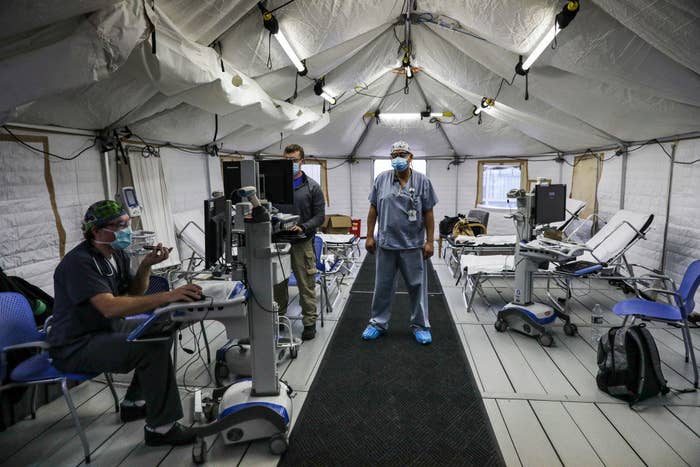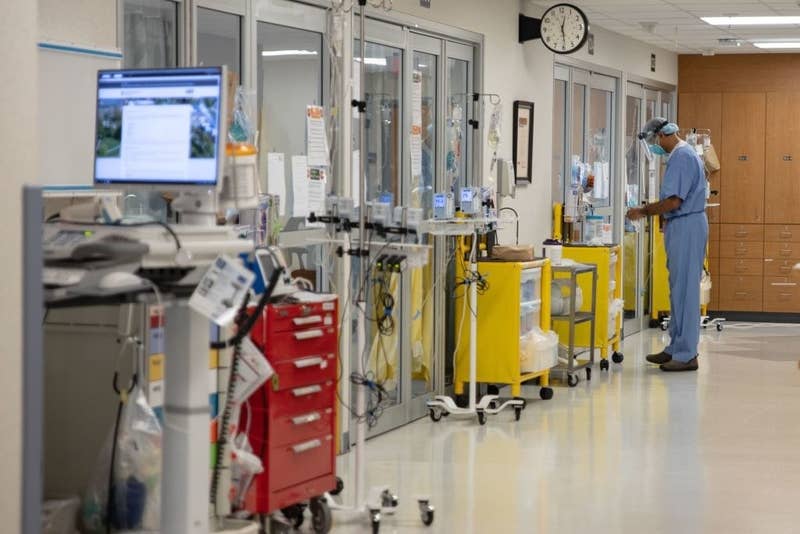As hospitals face the logistical nightmare of giving people the few doses of new antibody drugs available, scientists say they're concerned we still don’t have enough data to show they work.
Dan Vergano BuzzFeed News Reporter
Posted on November 25, 2020,

Boston Globe / Getty Images
Emergency medicine doctors work out of a temporary tent set up at UMass Memorial Hospital in Worcester, Massachusetts, Nov. 11.
The journalists at BuzzFeed News are proud to bring you trustworthy and relevant reporting about the coronavirus. To help keep this news free, become a member and sign up for our newsletter, Incoming.
As the third wave of the pandemic surges, a much-hyped COVID-19 treatment that just received a green light from the FDA — monoclonal antibodies — is beset by shortages and doubts over its effectiveness.
On Saturday, the FDA gave emergency authorization for monoclonal antibodies made by the pharmaceutical firm Regeneron, a drug cocktail dubbed a “miracle” cure by President Donald Trump after it was used in conjunction with other drugs to treat his coronavirus infection in October. Earlier this month, the agency authorized another monoclonal antibody treatment called bamlanivimab, made by the drug company Eli Lilly. Both therapies were authorized for use in patients who were recently diagnosed with COVID-19.
The concept of the treatment is simple: Doctors infuse lab-made antibodies into a patient’s blood, boosting their own natural immune defense against the coronavirus during the early stages of infection. So far, preliminary data suggest that the treatment could lessen symptoms and shorten hospital stays. But that benefit isn’t certain, medical experts say, and the drugs may even cause harm if they’re administered later in an infection.
“Although it is promising, it’s not possible to endorse bamlanivimab wholeheartedly,” said Harvard Medical School’s Rajesh Gandhi, an infectious disease physician at Harvard Medical School. “The level of evidence is just too low to come to a definite conclusion.”
Meanwhile, the federal government has started shipping out the few doses of the drug available so far, but hospitals face big challenges to actually give them to people. Because the drugs need to be administered intravenously via one-hour infusions, some doctors fear that the antibodies will only become available to wealthy communities where hospitals can afford to set up and staff infusion facilities.
“We are still figuring it out here and everywhere,” Gandhi said. “I don’t think we can say we have it all settled how patients will best get monoclonal antibodies.”
There is still no cure for COVID-19 — and the concerns over evidence and distribution make antibody therapies just the latest in a string of fraught treatments endorsed by the FDA. The only drug to receive the health agency’s full approval so far, remdesivir, has faced scrutiny over how well it works. Last week, the World Health Organization recommended against its use in hospitalized patients, saying, “There is currently no evidence that remdesivir improves survival and other outcomes in these patients.”
Then there is the case of convalescent plasma, the blood product from COVID-19 survivors that contains antibodies against the coronavirus, whose August emergency authorization was criticized for lacking sufficient evidence. Most infamously, after pressure from Trump in March, the agency endorsed hydroxychloroquine, only to revoke its authorization in June after studies showed it didn’t help patients with COVID-19 and came with dangerous side effects. The only drug shown to reduce deaths, the cheap and widely available steroid dexamethasone, is only recommended for use in patients who are severely ill and has yet to receive an endorsement from the FDA.
New COVID-19 drugs like monoclonal antibodies are desperately needed, Gandhi said, as medical centers nationwide strain under a third surge in the pandemic that led to 176,000 new cases and more than 88,000 hospitalized patients reported on Tuesday alone, with shortages of beds and staffers in many states.
But the challenges antibody therapies present just underline that prevention — not getting infected in the first place — is the best treatment, especially as case numbers surge ahead of Thanksgiving in the US. “I cannot emphasize enough the importance of flattening the curve, which is more important than any therapeutic advancement,” Gandhi said.

Megan Jelinger / Getty Images
A healthcare professional suits up to enter a COVID-19 patient's room in the ICU at Van Wert County Hospital in Van Wert, Ohio, Nov. 20.
Scientists still have big questions about how well antibody therapies work.
Eli Lilly’s clinical trial of bamlanivimab was a small one, enrolling only 452 patients who were recently diagnosed, who received three different doses of antibodies. It showed a lower rate of hospitalizations — but not a decreased chance of death — in patients who received the antibodies at the middle dose of 2,800 milligrams. The federal government however is distributing doses at the lowest dose of 700 milligrams, arguing that amount would still be effective while stretching supplies.
A clinical trial of the Regeneron treatment, which is a combination of two antibodies, showed that the drug reduced viral loads in patients and cut medical visits by 57% in the month after the infusion.
But both treatments ran into trouble when they were administered to patients who were further along in their illness, when the body’s own immune response can go haywire and cause a patient’s health to rapidly deteriorate. In October, Lilly halted a trial of its antibodies in severe COVID-19 cases after finding it offered no benefits. Shortly after that, Regeneron ended enrollment in a similar trial on the advice of its safety board.
For those reasons, an Infectious Disease Society of America committee has recommended against routine use of Lilly’s monoclonal antibodies for all COVID-19 patients, as did a panel with the National Institutes of Health. (Gandhi sits on both panels but did not speak on their behalf.) “Bamlanivimab should not be considered the standard of care for the treatment of patients with COVID-19,” the NIH COVID-19 treatment guidelines said.
Given that caution, the monoclonal antibodies are only recommended for high-risk patients who have recently been diagnosed with COVID-19, especially those with underlying health issues like obesity, diabetes, or heart disease, Massachusetts General Hospital infectious disease physician Robert Goldstein told BuzzFeed News.
Because of the uncertainty about the benefits of the treatment, doctors should decide which patients receive antibodies on a case-by-case basis, asking them if they want to take an unproven drug that might cause an unwanted reaction for unclear benefits.
Nevertheless, that still leaves a tremendous number of people who might benefit from the antibodies if they work, said Goldstein.
We are also facing a national shortage of doses.
The federal government is responsible for distributing the antibodies nationwide — but at the moment, there aren’t very many of them.
In the last two weeks, the federal government has shipped around 130,000 doses of the Ely Lilly antibodies to more than 2,400 sites across the country. On Tuesday, it shipped another 35,000 doses of the Regeneron antibodies.
The Department of Health and Human Services said it will be allocating only about 40,000 doses of bamlanivimab a week; Regeneron expects to have doses for about 80,000 patients by the end of November, according to the company. That’s less than half the number of new cases now recorded daily in the US.
“There is an enormous mismatch between the overall, presumed clinical need and the amount of drug available,” Goldstein said. Even if we knew exactly which patients to give them to, he added, “we’d still be trying to get a very small quantity of drug to a large number of people across the country.”
Medical centers, meanwhile, face challenges in setting up the infusion centers needed to distribute the drug.
“There's multiple challenges, the first being: Where do you have the location, and what is that location, and is that a safe location?” said infectious disease physician Lisa Davidson of Atrium Health, one of the country's largest medical systems, which operates nearly 40 hospitals and is based in Charlotte, North Carolina.
“One of the recommendations was to use infusion centers, but a lot of our infusion centers have immunocompromised patients that we really don’t want exposed to the coronavirus,” Davidson said. “Then some people suggest the emergency room. We don't want to flood our emergency rooms, and, you know, the numbers are so high all over the country. It’s a real challenge.”
Hospitals were still distributing the first 90,000 doses of the Elly Lilly antibodies, when HHS sent its second-week shipment of 40,000 doses, according to the agency.
Not all hospitals will be able to do the infusions — causing concerns that lower-income communities won’t have equal access to the drug.
There are at least two worries that the allocations might lead to the infusions going to the wrong places. The first is that HHS determines how many doses go to each state based on its number of new cases and hospitalizations. That might mean shipping doses to overwhelmed states that haven’t had the time or resources to set up the infusion centers needed to distribute them. Meanwhile, the more well-prepared hospitals could infuse more patients, but could end up with not enough doses for all the patients they’d like to treat.
“We will be watching closely in the first week or two and will adjust allocations accordingly,” John Redd, the chief medical officer of the HHS’s Office of the Assistant Secretary for Preparedness & Response, told BuzzFeed News by email. Redd said that to start, the agency will only provide the drug to hospitals “because we know they already have the infrastructure for drug administration” — rather than sending the drug to smaller health clinics.
But this could also mean that the infusions will only go to well-heeled hospital systems with the resources to set up separate infusion centers, leaving low-income and disadvantaged communities hardest hit by the pandemic out of luck.
“It’s not enough for the federal government to ship out the antibodies,” said the Cleveland Clinic’s Adarsh Bhimraj, speaking at an Infectious Diseases Society of America briefing on Monday. “Steps need to be taken so insurers pay for them and hospitals can set up transportation for patients to iron out this kind of unequal access to new treatments.”
The FDA Has Authorized The COVID-19 Antibody Drug That Chris Christie TookStephanie M. Lee · Nov. 10, 2020
Trump's Doctor Said The President Now Has Antibodies, Leaving Out The Fact That He Was Just Given A High Dose Of AntibodiesAzeen Ghorayshi · Oct. 7, 2020
These Updating Charts And Maps Show The Coronavirus Pandemic’s Impact Across The US And The WorldPeter Aldhous · July 9, 2020
Remdesivir Just Became The First Drug Approved By The FDA To Treat COVID-19Azeen Ghorayshi · Oct. 22, 2020

Dan Vergano is a science reporter for BuzzFeed News and is based in Washington, DC.
No comments:
Post a Comment